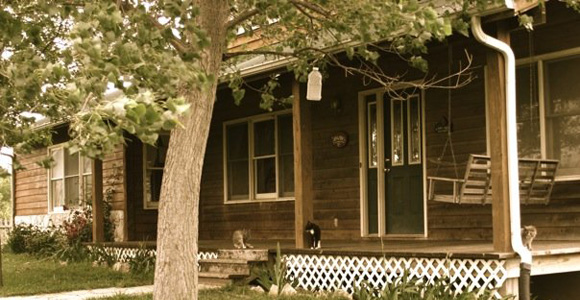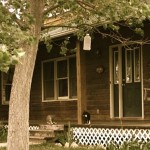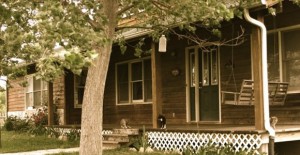This month marks the 10th anniversary of the Front Porch Republic. To honor the occasion, we’ll be running a few essays by some of the original Porchers in which they reflect on FPR’s origins and consider how its animating concerns–place, limits, and liberty–remain necessary in our globalizing age.
I remember the first ever meeting of the Front Porch Republic. It was convened sometime in the early months of 2009 by telephone. I was sitting in my law office in Perry, Kansas, joined on the phone by Jeremy Beer, Patrick Deneen, and Mark Mitchell. I had known Jeremy and Patrick from my days editing the New Pantagruel, but Mark was a new acquaintance. As the only lawyer in a group of academics (that is, the only one with a real job), I was made scrivener of the group. Technically speaking, this suggests the meeting actually took place in my law office.
Hence, I have always declared Perry, Kansas as the birthplace of FPR. A claim bolstered by the fact that the frontispiece image chosen to decorate FPR’s first cri de coeur (or more properly, its cri de joie)—written by Patrick—was a photo taken by my wife of our own Front Porch. So the first “Porch” of the ephemeral, digital-space named Front Porch Republic was a real porch in a real place. Yes, it’s ironic, in an Alanis Morrissette kind-of-way. We knew that then.
In that first statement, Patrick described our animating concern as a fear that citizens in our society did and increasingly would:
regard the State as a distant and mysterious entity, occupied either by our team or their team but in either event an organization so vast, complex and dizzying that we regard it as anything but the locus of our practice of shared self-governance. We are daily less a republic because we daily perceive less of what are common or public things – res publica. Without the literal spaces where we come to know what we have in common through speech, habit and memory, we regard politics as a competitive spectator sport and government as a distant imposition – but in any event, anything but self-rule.
At its best, we four hoped the journal would take a spot in the honorable tradition of “little magazines” and pamphleteers that stood outside what, it was feared, had become a stagnant and dying “consensus” that actively denied even the possibility of a shared and common good beyond and above politics. Sure, it sounds cheesy, but we believed in a commonwealth of beauty, responsibility, freedom, work, fruitfulness, care, and affection. As I put it in my first FPR essay, we stood with “proto front porcher John Ruskin” who rallied to the cry that “there is no wealth but life!”
Beyond that, there was no political or partisan agenda. And the earnestness of that pre-Twitter truth is hard to get one’s head around in a social-media-frenzied world. We hoped FPR would be animated by the spirit of such un-categorizable figures as Ruskin, Christopher Lasch, and of course, Saint Wendell.
As I put it in a later essay, the work of FPR, in my view, would “require love above all … and no amount of anger or stumbling about trying to recover a lost identity will forge a lasting [commonwealth] if it has not love.” I worried that the challenge inherent in projects like FPR was “the preservation of this love across the divide” as various particularist or populist “reactions to dispossession break out into political and social movements.” And I warned that “at best,” these reactions could lead to nothing more significant than various “lifestyle choice[s]” and “at worst they will lead to bitter, diseased ghettos of pathetic victims with delusions of vengeance.” Ten years further on—now living through some of the worst of these “break outs”—this warning has more bite than it once did.
But I hoped—sent it up as a kind of prayer to the gods of the interwebs—that the work of FPR and similar movements would persevere in love. “Love is [our] existential engine, after all.” It was that sentiment that led me, in the end, to retire quietly from FPR in 2010. Which, though I don’t endorse one way or the other anything in particular that has appeared in FPR, should not be taken as a quiet rebuke of the project. Instead, it arose from a personal conviction that, as I once heard a member of the Bruderhof Community say, “writing about the work is not the work.”
In another early contribution I made to FPR, I reviewed Bill Kauffman’s Look Homeward, America. In it, he wrote: “[T]he most ennobling work we do is seldom remunerated in greenbacks. … This, in fact, is the work that should be honored on Labor Day. The work we do for ‘nothing.’ (For everything, really.) … This is the work whose coin, whose only coin, is love.” This gave me the perfect segue into one, perfect paragraph in Whittaker Chambers’ Witness:
Our farm is our home. It is our altar. To it each day we bring our faith, our love for one another as a family, our working hands, our prayers. In its soil and the care of its creatures, we bury each day a part of our lives in the form of labor. The yield of our daily dying, from which each night in part restores us, springs around us in the seasons of harvest, in the produce of animals, in incalculable content.
That is the work—universal to all people at all times in all places. Long may it endure.





2 comments
dave
I remember you as rather cantankerous, and was sorry to see you drop off the lineup. Appreciated your contributions. Have to admit I picture you as a fellow potrayed in a Thomas Hart Benton painting. Hope the grabbing a root and hanging on is working out.
Russell Arben Fox
You’re missed, Caleb. But the Notes from Mud Creek live on, or so I hope!
Comments are closed.